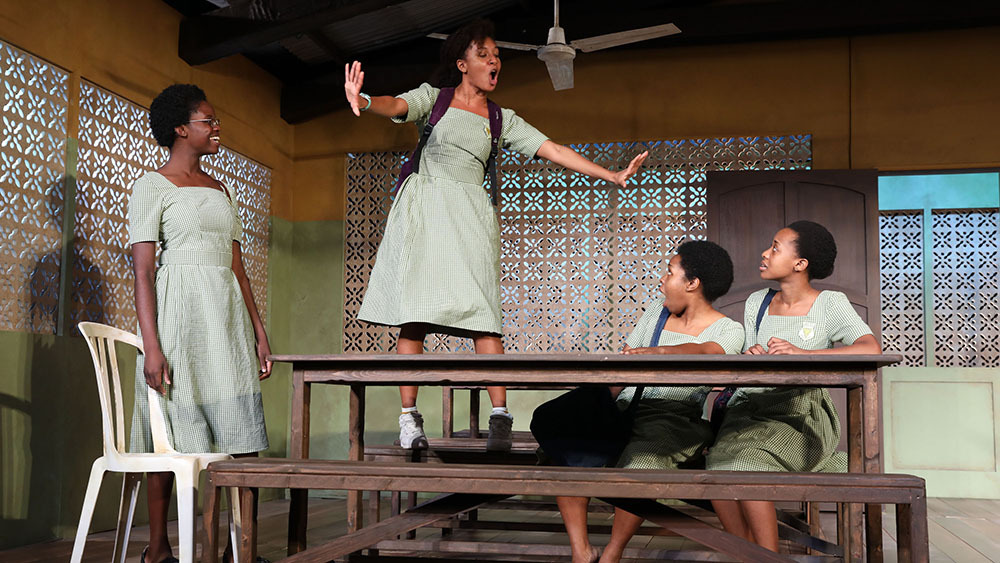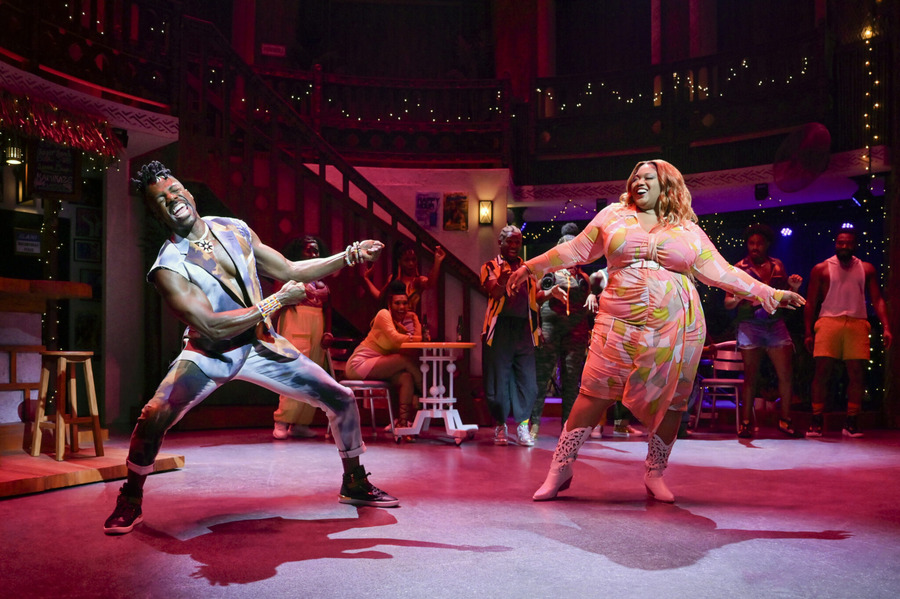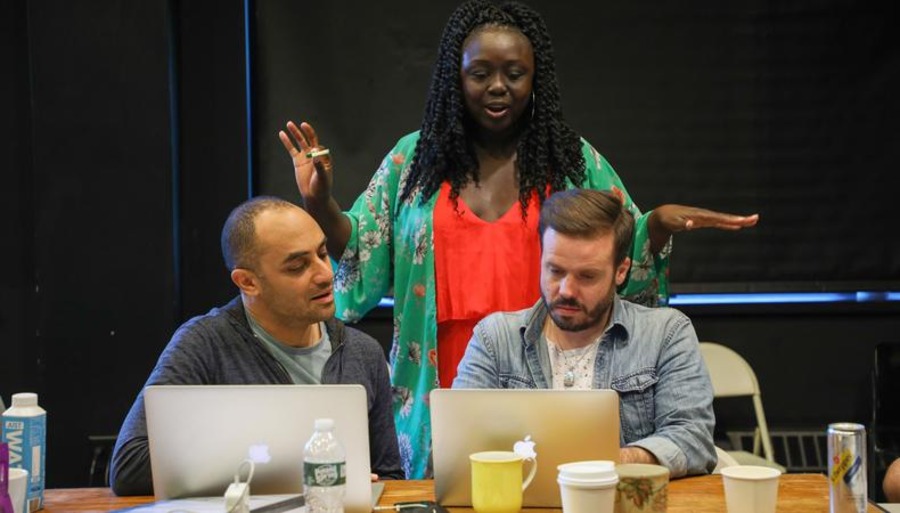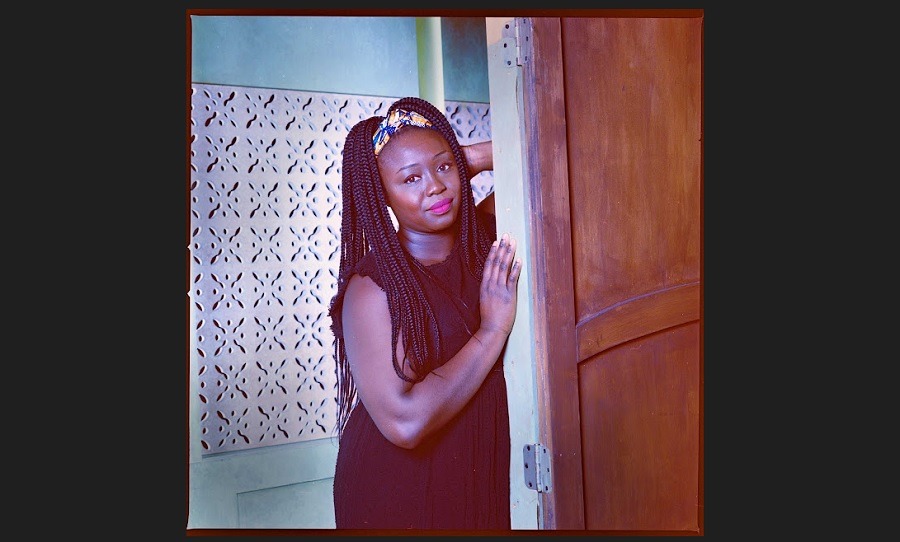When you’re in the audience at a Jocelyn Bioh play or musical, you can expect a few things. For one, a comedy that leaves your stomach in knots. You can also expect a truthful story about people simply, vulnerably existing in their own world, and you can be sure that story will challenge notions that Western culture has about African people.
In a recent interview, Bioh told me that her goal as a writer is first and foremost to entertain audiences. But her work does far more than simply delight; it also shines a light. With plays like School Girls, or the African Mean Girls Play, Nollywood Dreams, and her current musical Goddess—now at California’s Berkeley Rep, and rumored to be eyeing Broadway—Bioh is doing her part to reshape African narratives in the American theatre, telling comedic and truthful stories that American stages hadn’t seen before.
School Girls was most theatre audiences’ introduction to Bioh’s work, with an MCC Theatre production in 2017 that extended several times and led to the play being one of the most-produced plays in the U.S. in the 2019-20 season. Set in a Ghanaian boarding school, the play follows a clique of teenage girls preparing for the Miss Ghana Global Universe pageant. When a biracial transfer student is added into the mix, issues of colorism, self-esteem, and beauty standards within the Black community arise. Colorism is a particularly difficult and sensitive topic, but with her comedic approach, Bioh’s show made people laugh, cry, and remember. It showcased one of her signature talents: an ability to address important issues affecting the African diaspora without lecturing. For an industry still grappling with diversity and inclusion onstage, Bioh goes beyond the surface level to tell stories that have been overlooked, while keeping them entertaining.
Bioh had to carve out a place for herself in the American theatre because there wasn’t one for her already. In fact, an early play of hers was consistently rejected because it didn’t include stereotypical caricatures of African people. Before School Girls, she wrote Nollywood Dreams, a romantic comedy about a young girl aspiring to leave her parent’s travel booking agency to become the next big star in the Nigerian film industry. As audiences would later see when it finally got a production, at MCC last year, the play was a Bioh classic destined for the stage. But as her show didn’t include rape, poverty, or drugs, prospective producers didn’t know what to do with it. One who read the play even criticized Bioh’s characters for being “too happy.” While playwrights like Mfoniso Udofia and Danai Gurira had made some inroads for African stories, they haven’t worked primarily in a comic register. So most theatres didn’t know where to place Bioh’s work.

That is, until New York’s MCC Theater took a chance on School Girls, which was greeted with standing ovations and multiple extensions. Nothing changes producers’ minds like success.
“African comedy—you know, those two words can be synonymous,” Bioh said. “The key is about just giving people a chance. Sometimes they may fail, but you may end up with something kind of groundbreaking and exciting and thrilling in a way that you never anticipated.”
“Y’all might have got it wrong about Africa,” said Abena, who played the role of Adenikeh in Nollywood Dreams and received a 2022 Lucille Lortel award nomination for Outstanding Feature Performer in a Play. Abena has starred in every Bioh stage play dating back to 2017, including Merry Wives, Bioh’s contribution to last summer’s Shakespeare in the Park. One of the reasons Abena is continuously drawn to Bioh’s stories is that her shows are populated by folks for audiences to laugh with, not laugh at. Her characters are “people who have hopes and wants and dreams. And there’s glamor and there’s glitz, and there’s love and there’s joy, and there’s happiness and there’s laughter.”
For Abena, Bioh’s shows authentically tell stories of the African community through their lens. Abena knows, because she recognizes them from her own upbringing; her father is of Ghanaian descent, and she noted the way people of African cultures uphold elders in their communities. She saw this reflected in Nollywood Dreams, in the way the young character, Ayamma, addressed her character, Adenikeh, who Abena has described as the “Nigerian Oprah.”
“She chose to do this curtsy or bow that might seem kind of outdated or outlandish over here, but I understood, just because I’m like: Yeah, that’s what we do!” Abena said. “Like, we just have this reverence for elders or people that are of a status above that. I think that if somebody didn’t have that knowledge, that wouldn’t be a natural instinct. Just those little things—that’s what makes up a culture.”

Bioh never misses a beat, or a bow, and hits every cultural reference. But while her shows take place in Africa and/or center African communities in the U.S., the familiarity extends globally. Her stories stem from her Ghanaian background as the child of immigrants to this country, but her stories resonate with immigrant families across different diasporas.
“It’s not even just first generation Black immigrants,” Bioh said. “I’ve heard from people who are of Indian descent, from people from different Asian cultures, from people of the Latine community, that they feel a connection to my work because of the universality of the immigrant experience and the kind of humanity that I’m bringing to that experience—or at least that I hope I’m bringing to that experience. That’s what they connect with.”
When asking her how she devises her multifaceted and well-rounded characters, she answered: by writing what she knows, creating characters based on the people she meets in the hair salon or who mirror the relationship she has with her sister. And these characters aren’t just people she recognizes, but people that diverse audiences recognize from their lives too. Whether it’s the immigrant parents who don’t understand artistic or creative careers, or the dreams and fantasies that many immigrants believe America exists to answer, it’s these stories that sell out the house for a Jocelyn Bioh play. The accents may vary, but the heart of the story remains the same.

For Goddess, Bioh collaborated with director Saheem Ali and composer Michael Thurber to modernize an ancient African folktale. Setting the action in a modern-day jazz club and using sounds from Afrobeat music, Goddess retells the myth of Marimba, a love story in which the goddess of music sets out to find love after being cursed. Critics are already forecasting the show’s Broadway future, but wherever it plays, the show is another reminder that there is love, beauty, and humanity within African stories and lives.
Jocelyn Bioh, whose next show, Jaja’s African Hair Braiding, was just announced for a run at Manhattan Theatre Club next fall, may be one answer to those who are wondering what the future of the American theatre, and its audiences, may look like. Bioh is inviting in folks who haven’t seen their stories truthfully told onstage, and is showing them that they’re welcome—and showing everyone else that there’s more than one side to every story.
“My goal is always, first, to entertain,” Bioh said. “I think second is to have people walking away, feeling like they now have a different understanding of either a culture, a person, a country—they now have a more unique perspective on that thing than they had walking in.”
Rachelle Legrand (she/her) is an editorial contributor to American Theatre.





